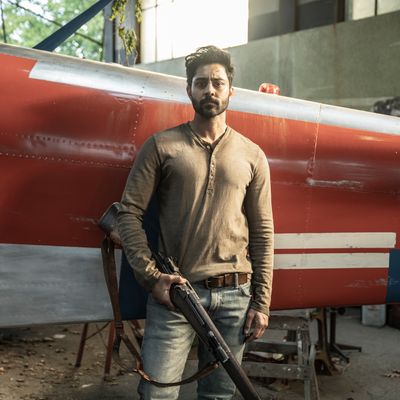
Photo: Emmanuel Guimier/AMC
What does the endgame of The Walking Dead: Daryl Dixon look like? Hell, what does the endgame of The Walking Dead universe look like? It’s a question I’ve been thinking about as we near the end of this season. This is a franchise that could go on indefinitely, sure, but it would be nice to know the writers had some plan for Daryl and Carol’s respective character arcs besides just following the same general trajectory from the first 11 seasons of storytelling.
These final few episodes of season two feel like a transitional time for this show, concerned more with clearing the deck for what’s next than bringing the story to a satisfying end in its own right. I stand by my high rating for “La Paradis Pour Toi,” which lurched the plot forward in exciting ways, but this time, the big moments play out a bit predictably. It’s not quite limping to the finish, but it does suddenly feel like the show is getting bored of itself, ready to start anew.
“Vouloir, C’est Pouvoir” largely revolves around Daryl and Carol’s search for two missing friends: Laurent and Ash. They find Laurent and Fallou at the camp in Paris pretty quickly, along with a newly arrived (and very much alive) Codron and presumably other scattered members of the resistance. But Ash is harder to track, having left behind a fortified base full of traps to protect the plane.
Before we get to the action, though, there’s a lot of somber chitchat to sit through. These are the meaty in-between scenes where the themes of the show should really come into play, where the stakes should only get higher. But Jason Richman and David Zabel’s script hits on the same few topics as always. Daryl is still torn between his old home at the Commonwealth and his new home with Laurent — and he still can’t openly speak about Isabelle or what she meant to him. Laurent still yearns to do “normal things” and find a true safe haven. And Carol is still guilty about the lie she told Ash.
At least there’s some insight into Codron, whose face turn never totally made sense to me. Here, he describes the spiritual journey he went through back when he was forced to choose between killing and sparing Laurent. He felt like God “was watching him to see what he’d do.” Then, his time at Maison Mère gave him the space for the lesson to really sink in. The explanation helps smooth out some past character inconsistencies in a thematically relevant way, though I can’t help feeling like Codron is marked for death no matter where he ends up morally. This just sets up a heroic sacrifice like the one that almost happened last episode.
The search for Ash brings Daryl and Carol first to the Demimonde, now run by Quinn’s girlfriend, Anna (remember Quinn?), then to Maison Mère. It turns out Ash is trapped and concussed in a broken-down car completely swamped with walkers, a problem you’d think Daryl and Carol could solve with a little more planning and tact. Instead, they get hemmed in and end up stuck in the car like ducks, saved only by an inspired move from Daryl: shooting up a couple walkers with extra super-serum, turning them into walking explosives to disable the other walkers.
Daryl goes looking for ethanol, a quest that takes him back to the Demimonde. Laurent and Codron are there with news: Losang has come to the village looking for Laurent. This plays into the kid’s growing conviction that he gets everyone he loves killed, a fear that keeps him from eagerly tagging along with Daryl. But they’re forced to flee together through a hidden tunnel when Losang and Jacinta track them to the Demimonde, leading to the pair of fights that serve as the episode’s climax.
Both are exciting enough, though short and darkly lit. Codron throwing Jacinta against the wall and leaving her there unconscious is especially frustrating. Come on, Stéphane. How have you not learned by now that you gotta finish the job? Daryl gets it: He actually beats Losang to death with a skull, a gnarly act that could’ve used a little more gore and cruelty. It also feels a tad anticlimactic after following the man’s faith journey throughout this season. Daryl was probably always going to kill Losang in the end, but there’s something missing here, some reckoning with how this man’s faith mutated into something dangerous and evil. Instead, he’s quickly killed like Madame Genet and the other villains on this show, leaving the underdeveloped Jacinta as the sole remaining antagonist to deal with in the finale.
While Daryl is busy looking for fuel and dealing with Losang, Carol contemplates how to come clean to Ash about Sophia. It’s a moment I’ve dreaded for most of the season, and it plays out pretty much how I expected: Ash feels justifiably betrayed, having given up his comfortable solitary existence for this insanely dangerous journey. Sure, that existence was depressing and boring, and just today he told Carol that this trip got him to finally move past his guilt about his son, Avi. But now he knows their bond was built on a lie, and that hurts.
The scene does feel a little lacking, somehow, maybe because Ash’s reaction is basically what I imagined, no more or less explosive or painful. By the time Daryl has secured Laurent, Ash’s feelings have already softened; it’s clear that he’s not angry enough to do something stupid like snap and hurt Carol or the others. He seems reluctantly willing to transport the kid, though the plane can’t accommodate four people.
I expect next week’s finale to be a farewell tour of sorts, a good-bye to France and this general cast of characters outside the two people in the name. There’s already a lot of that in “Vouloir, C’est Pouvoir.” Barring some dark twist, it sure seems like there’s one obvious bittersweet ending this penultimate episode is setting up, with two people staying in Europe while the wrong two head back to the States. (Laurent is probably somewhere around the same age as Avi would be, right?)
I’m certainly interested to see what a change of location brings in season three, and this episode does plenty of competent work transitioning the show to that next phase. But I do wish there was some sense of what else this means for Daryl and Carol as individuals. This began as a show about a stoic man slowly learning to let love into his life, reconsidering his personal definition of home in an apocalyptic wasteland. The years have begun to pile up since this all began, and the long-abandoned concept of normalcy has slowly returned as a possibility, which should allow for different types of psychological explorations, but I’m not sure we’re there yet. For all the discursive conversations about finding meaning in a dying world, this is still fundamentally a show where plot takes precedence over character.





